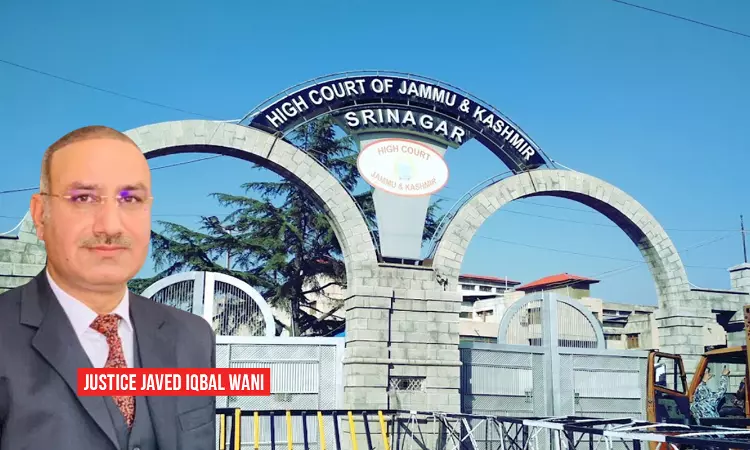- Home
- /
- High Courts
- /
- High Court of J & K and Ladakh
- /
- J&K Agrarian Reforms Act | ...
J&K Agrarian Reforms Act | Landlord-Tenant Relationship To Be Established Between Parties To Avail Ownership Rights U/S 4, 8 : High Court
Basit Amin Makhdoomi
26 Sep 2023 12:40 PM GMT
The Jammu and Kashmir and Ladakh High Court has recently ruled that in order to get the benefit of Sections 4 and 8 of the Agrarian Reforms Act, 1976 it has to be established that there was a relationship of a landlord and tenant between the parties and a tenant who was in possession of the land was paying rent to the landlord.Justice Javed Iqbal Wani emphasized that the Act aimed to...
The Jammu and Kashmir and Ladakh High Court has recently ruled that in order to get the benefit of Sections 4 and 8 of the Agrarian Reforms Act, 1976 it has to be established that there was a relationship of a landlord and tenant between the parties and a tenant who was in possession of the land was paying rent to the landlord.
Justice Javed Iqbal Wani emphasized that the Act aimed to extinguish the landlord-tenant relationship and provided a specific process for tenants to benefit from it. This included attestation of mutations under sections 4 and 8, based on the existence of a landlord-tenant relationship.
"…The Act of 1976 was brought into existence to extinguish the relationship between a landlord and a tenant and a scheme thereby was formulated under the said Act itself as to how and in which manner the said relationship should come to an end. Under the Act, in order to get benefit of Sections 4 and 8 it had to be established that there was a relationship of a landlord and a tenant between the parties and a tenant who was in possession of the land in Kharief 1971 and was paying rent to the landlord”.
Under the Agrarian Reforms Act, Section 4 defines criteria for tenants to qualify for benefits, including possession of the land during Kharief 1971 and payment of rent. Similarly, Section 8 deals with issuing Mutation Certificates to eligible tenants, confirming changes in land records to recognize them as legitimate occupants or owners.
The petitioner filed a petition under Article 226 challenging two orders: one passed by the Financial Commissioner (Revenue)/Commissioner Agrarian Reforms on 15.5.2019 and another passed by the J&K Special Tribunal on 11.6.2019. The dispute revolves around mutations attested under the Agrarian Reforms Act, in favour of the petitioner.
The respondents, aggrieved by these mutations, filed an appeal in 2015, claiming that their father, who had passed away in 1977, was the rightful owner of the land. They alleged that the petitioner's father was a hired labourer without any landlord-tenant relationship. They alleged that the mutations were attested illegally and that they were not given notice.
The appellate forum entertained the appeal, condoned the delay in filing it, and set aside the Mutations, remanding the matter for a fresh inquiry. The forum found fault with the attestation process, particularly in regard to the 'Sehti Kasht' Mutation. The respondents then filed a revision petition, which was also dismissed by the Jammu & Kashmir Special Tribunal.
The appellate forum, in 2017, condoned the delay in filing the appeal and set aside the mutations, remanding the case for a fresh inquiry. The petitioner subsequently filed a revision petition before the Jammu & Kashmir Special Tribunal, which upheld the appellate forum's decision.
The petitioner challenged both orders, claiming that they were not decided correctly and that the delay in filing the appeals was wrongly condoned.
In order to address the matter, the bench examined the provisions of the Agrarian Reforms Act of 1976 and observed that the Act aimed to extinguish the landlord-tenant relationship and provided specific criteria for tenants to qualify for its benefits, including those under Sections 4 and 8.
The court noted that the land was agricultural and had a recorded history of the father of the petitioner being a tenant before the Agrarian Reforms Act came into force. However, no mutations were attested under sections 4 and 8 of the Act in favour of the petitioner's father during his lifetime.
“The Mutations under sections 4 and 8 indisputably came to be attested in favour of the petitioner herein in the year 1982 and 1983 respectively only after, in the first instance, the official respondent effected a change in the Girdawari by attesting “Sehti Kasht” Mutation No. 2369 on 18.6.1982 that too without any enquiry whatsoever conducted which ought to have been conducted under and in terms of Rule 4 of the Agrarian Reforms Rules 1977”, the bench pointed.
It was clear from the records that these mutations were only attested in favor of the petitioner in 1982 and 1983 after a change in the Girdawari through the 'Sehti Kasht' Mutation, which was done without proper inquiry as required by the Agrarian Reforms Rules.
Given these findings and the fact that both lower forums had concurred on these issues, the court declined to exercise its jurisdiction under Article 226 of the Constitution.
The petition was thus dismissed. The court made it clear that this judgment was specific to the issues raised in this petition and did not express an opinion on the matter to be decided by the Assistant Commissioner, Revenue, during the fresh inquiry.
Case Title: Ama Teli V/s Manzoor Ahmad Bhat and others
Citation: 2023 LiveLaw (JKL) 254
Case No: WP(C) 3722/2019 CM(7664/2019)


